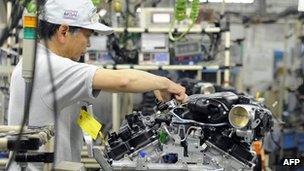Japan's rising machinery orders boost the economy
- Published

Manufacturing sector is one of the biggest contributor to Japan's economic growth
Japan's core machinery orders, a key indicator of capital expenditure, rose more than forecast in April in a positive sign for the economy.
Orders rose 5.7% from a month earlier. Most analysts had projected a 1.5% growth.
The figures come amid fears that a slowing economy coupled with a strong yen might see manufacturers shift production overseas.
However, analysts said the data showed that firms were confident about growth.
"The machinery orders are an early indicator of how the economy is doing, giving us an hint of investment trends," Martin Schulz of Fujitsu Research Institute in Tokyo told the BBC.
"Strong orders indicate that reconstruction demand is kicking in, which is a good sign as domestic economy is going to be key to overall growth this year."
Bank action
The strength of the Japanese yen has been one of the biggest concerns among Japanese manufacturers.
A strong currency not only makes Japanese goods more expensive to foreign buyers but also hurts their earnings when they repatriate earnings back home.
The yen has been highly volatile in recent months, rising by more than 10% against the US dollar between April and October last year. It was trading at 75.75 yen against the US dollar in late October.
That led to the Japanese central bank intervening in the currency markets.
Though the currency has weakened since, it still remains at a level considered high by most Japanese manufacturers.
It was trading close to 79.67 yen against the US dollar in Asian trade on Wednesday.
The strong currency has led to concerns that Japanese firms may lose their competitiveness and be forced to shift their production overseas.
However, analysts said that strong action by the Japanese central bank to stem the yen's rise in the past had helped to allay those fears.
"Japanese policymakers have been prepared to intervene in the market and that is providing another layer of comfort to the Japanese businesses," said Mr Schulz of Fujitsu Research Institute.